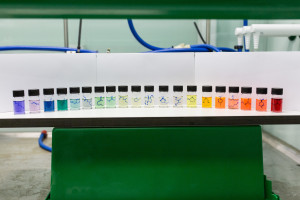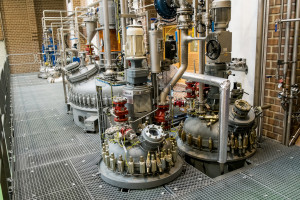Solvents are ubiquitous chemicals used widely in coatings, adhesives, industrial and domestic cleaning (degreasing) products, and many types of manufacturing. The purpose of the solvent in a formulation or process is to dissolve other substances, either to allow them to mix and perform their function effectively (e.g. to disperse the pigment in a paint) or remove them from a surface (e.g. a paint stripper). In Europe the solvent industry directly employs more than ten thousand people with sales of over 5 million tonnes (worth €3 billion) every year. The global solvents market is about 30 million tonnes and growing at about 2% per annum.

Solvents toxicity may harm human beings and the environment
Unfortunately many solvents are categorised as substances of very high concern under the European REACH regulation and equivalent legislation around the world. Most solvents are VOCs, flammable, and can be highly toxic. Conventional solvents are generally unsustainable petrochemical products. Two examples are N-methyl pyrrolidone (NMP, known to damage fertility yet European use exceeds 10 million litres a year ) and toluene, with a 1.2 billion litre annual European market but suspected of damaging the unborn child, and may cause damage to organs through prolonged or repeated exposure. The uses of these solvents are increasing being subject to restrictions to promote human health and environmental protection. Unless a new approach to the solvent sector is implemented, regulatory measures will have a huge knock-on effect, curtailing growth in the many industries currently reliant on conventional solvents to the detriment of their many customers and employees.
ReSolve aiming to produce sustainable bio-products

The ReSolve project is set to demonstrate the production of novel, carbohydrate based, alternatives to NMP and toluene, while creating an additional pipeline of further bio-based solvents for other uses. By using biomass instead of fossil precursors, solvents will be developed with unique functionalities complimentary to the feedstock. In doing so the signature molecular structures in solvents that give rise to chronic toxicity hazards will be avoided. To confirm this an innovative, cost-effective and integrated testing strategy for rapidly evaluating the toxicology of candidate solvents will be established. Using life cycle analysis and experimental testing, ReSolve will also validate the low environmental impact and high application performance of novel solvents.
Techno-economic evaluations will be used confirm if production is viable at a scale fitting of a commodity product. On this basis two flagship bio-based solvents will be taken forward into pilot plant production. Appropriate markets and end-users have been identified who can demonstrate that the replacement of NMP and toluene with these bio-based alternatives is beneficial from an economic, social, and environmental perspective. During the course of the project many other solvents will be produced and tested in smaller quantities. These compounds will subsequently be developed for other applications where hazardous solvents also need to be substituted.
About Resolve: ReSolve is a €4.3 million EU project dedicated to replacing traditional, fossil-based solvents with safer bio-based alternatives. Led by the University of York (UK), the project consortium is comprised of 11 partners from 5 countries. ReSolve was officially launched on 15th June 2017 and is due to finish in May 2020. This research runs under the umbrella of the Bio-based Industries Joint Undertaking (BBI-JU), which is a public-private partnership between the European Commission and the Bio-based Industries Consortium (BIC).
The ultimate goal of the ReSolve project is to start a process of introducing new, safer bio-based solvents into common use. This will allow Europe’s solvent industry to avoid the negative economic impact of the regulatory restrictions now limiting the use of hazardous solvents. Rigorous research and development will make the outputs from ReSolve relevant to thousands of businesses, and reduce the health impact on the millions of people that are routinely exposed to solvents as part of their job or leisure activities.
Project website: http://resolve-bbi.eu/
Partners: Avantium Chemicals; Bio Base Europe Pilot Plant; BioDetection Systems; Circa Sustainable Chemicals; Nitto Belgium; Norske Skog; Nova-Institut; Process Design Center; Toegepast Natuurwetenschappelijk Onderzoek; University of York; Wageningen University & Research.
Funding acknowledgement: This project has received funding from the Bio-Based Industries Joint Undertaking under the European Union’s Horizon 2020 research and innovation programme under grant agreement No. 745450.
This article from James Sherwood (Green Chemistry Centre of Excellence of York) reflects only the author’s view and the BBI JU is not responsible for any use that may be made of the information it contains.
ReSolve Contacts: Thomas Farmer, Janice Lofthouse.



